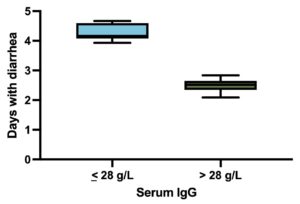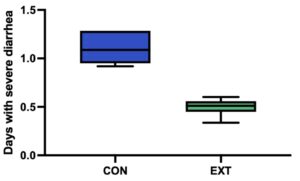Inleiding
Het belang van biest in de eerste uren van het leven van een kalf wordt algemeen erkend, aangezien pasgeboren kalveren geboren worden met een naïef immuunsysteem en volledig afhankelijk zijn van biest om passieve immuniteit te verwerven. Traditioneel is deze voeding beperkt tot een enkele dosis biest van hoge kwaliteit (> 50g/L IgG) binnen de eerste uren na de geboorte. Nieuw bewijs suggereert echter dat het uitbreiden van biestvoeding met overgangsmelk (TM), gedefinieerd als melkingen 2 tot 6 na het kalven (Godden, 2008), aanzienlijke gezondheids- en prestatievoordelen kan bieden aan jonge kalveren tijdens de kritieke eerste levensweken.
Overgangsmelk behoudt veel van de nutritionele en immunologische voordelen van colostrum in een lagere concentratie, waaronder verhoogde concentraties vet, eiwit, immunoglobulinen, groeifactoren, hormonen en oligosacchariden, die allemaal aanwezig zijn in niveaus die veel hoger zijn dan die gevonden in volgroeide melk (Fischer-Tlustos et al., 2020). Deze bioactieve stoffen dragen bij aan de ontwikkeling van de darmen, de opbouw van het microbioom, de rijping van het immuunsysteem en de metabolische stabiliteit, vooral tijdens de eerste maand, wanneer kalveren het meest kwetsbaar zijn voor ziekten en omgevingsstressoren (Quigley & Drewry, 1998).
Een toenemend aantal studies heeft aangetoond dat langere biest- of TM-voedering de gemiddelde dagelijkse winst (ADG) verbetert, ademhalings- en spijsverteringsaandoeningen vermindert en de sterfte onder kalveren en het gebruik van antimicrobiële middelen verlaagt (Berge et al., 2009; Chamorro et al., 2017; Kargar et al., 2020; Cantor et al., 2021). Het voeren van verrijkte vloeibare diëten gedurende 4 tot 14 dagen na de geboorte wordt in verband gebracht met betere prestaties op de lange termijn, hoewel de resultaten variëren afhankelijk van de formulering en het protocol (Van Soest et al., 2020). Bovendien kunnen colostrale antilichamen die in het darmlumen achterblijven na het absorptievenster nog steeds lokale immuunbescherming bieden, wat bijdraagt aan minder darminfecties en een betere ontwikkeling van de darmvlokken (Hare et al., 2020).
McCarthy et al. (2023) toonden aan dat het aanvullen van melkvervangers met biestvervangers het ADG verbeterde en het risico op diarree en sterfte tijdens de periode voor het spenen verminderde. Deze bevindingen suggereren dat overgangsmelkstrategieën effectieve, onderbenutte hulpmiddelen zijn om kalveren te ondersteunen tijdens risicovolle periodes zoals ziekte-uitdagingen, vaccinatie, onthoornen en spenen.
Carter et al. (2022) onderzochten het gebruik van rundercolostrum als therapeutische interventie voor diarree. In totaal werden 108 kalveren van een commerciële kalveropfokinstelling in Canada ingeschreven na diagnose van diarree en willekeurig toegewezen aan een van de drie behandelgroepen: (1) controle, (2) kortdurende colostrumsuppletie gedurende 2 dagen na het begin van de diarree (50% MR + 50% CR), of (3) langdurige colostrumsuppletie gedurende 4 dagen na het begin van de diarree (50% MR + 50% CR). Kalveren in de langetermijngroep hadden een snellere oplossing van diarree en groeiden gemiddeld 98 g/dag meer over een periode van 56 dagen vergeleken met de controlegroep. Deze bevindingen ondersteunen het gebruik van biestsupplementen als een niet-antibiotische strategie voor de behandeling van kalverdiarree, met positieve gevolgen voor zowel de gezondheid als de groeiprestaties.
De praktijkproef: Melkveebedrijf Koepon
Om dit concept onder commerciële bedrijfsomstandigheden te testen, werd een praktijkproef uitgevoerd op het melkveebedrijf van Koepon door student-onderzoeker Ruth Huinder, in samenwerking met colostrumspecialist Dr. Juliana Mergh Leao en Dr. Dave Renaud, professor aan de Universiteit van Guelph.
Opzet onderzoek
Twintig vrouwelijke Holstein-kalveren werden ingeschreven en willekeurig toegewezen aan een controle- of testgroep. Alle kalveren kregen twee eerste voedingen (4L + 2 L) met hoogwaardige maternale biest (> 25% Brix) en kregen maternale overgangsmelk op dag 2 en 3, gevolgd door melkvervangers. De testgroep (EXT) kreeg echter een extra aanvulling met SCCL-biestvervanger: 70 g colostrumpoeder (CCT 14% IgG) gemengd met 140 ml water (gemengd bij een temperatuur van 43-49 °C en gevoederd bij lichaamstemperatuur), wat 420 ml per dag opleverde. (in twee voedingen verdelen)dagelijks toegediend van dag 4 tot en met dag 14.
De kalveren werden gecontroleerd op gewichtstoename en gezondheidsscores over een periode van zes weken, inclusief evaluaties van de consistentie van de ontlasting, ademhalingsstatus en algemene conditie.
Resultaten
- De testgroep (EXT) behaalde een numeriek hogere gemiddelde dagelijkse groei van 135g/d in vergelijking met de controlegroep gedurende de eerste 3 weken. De totale groei was +35g/d gedurende de eerste 6 levensweken.
Tabel 1. Gewichten van de test (EXT) - en controlegroep bij de geboorte, week 3 en 6 en berekende gemiddelde dagelijkse gewichtstoename van geboorte tot week 3, week 3 tot 6 en van geboorte tot week 6.
| Gewicht bij geboorte | Gewicht bij 3 weken |
Gewicht bij 6 weken |
ADG |
ADG |
ADG |
|
| Test (EXT) |
40.84 |
61.80 |
72.82 |
1.00 |
0.57 |
0.78 |
| Controle (CON) | 40 | 57.98 | 71.73 | 0.88 | 0.63 |
0.75 |
- Abnormale uitwerpselen kwamen significant vaker voor in de controlegroep, vooral tijdens week 3 en 4 - tijdstippen die samenvielen met routinematige stressgebeurtenissen zoals vaccinatie, onthoornen en verplaatsing.
Het gemiddelde aantal dagen met diarree (gedefinieerd als een ontlastingsscore van 1 of 2) was 3,40 ± 2,01 bij CON-kalveren en 3,40 ± 2,37 bij EXT-kalveren. In een Poisson regressiemodel was er geen significant verschil in diarree-incidentie tussen de behandelingsgroepen (IRR: 0,11; 95% CI: -0,37 tot 0,60; P = 0,64), noch was geboortegewicht geassocieerd met het optreden van diarree (P = 0,94). De serum IgG-concentratie was echter wel significant geassocieerd met het risico op diarree: kalveren met serum IgG > 28 g/L hadden een lagere incidentie van diarree (IRR: 0,58; 95%CI: 0,35 tot 0,95; P = 0,03) in vergelijking met kalveren met IgG < 28 g/L (Figuur 1).

Figuur 1. Voorspelde dagen met diarree in de loop van de tijd op basis van serum IgG uit het repeated measures model, met controle voor behandelgroep en geboortegewicht.
Het gemiddelde aantal dagen met ernstige diarree (fecale score van 2) was 1,10 ± 0,88 in CON en 0,50 ± 0,71 inEXT. In het Poisson model, met controle voor IgG (P = 0,31) en geboortegewicht (P = 0,81), was de behandelgroep geassocieerd met de uitkomst. Kalveren in EXT hadden een lagere incidentie (IRR: 0,40; 95%CI: 0,14 tot 1,19; P = 0,099) van ernstige diarree in vergelijking met CON (Figuur 2).

Figuur 2. Voorspelde dagen met ernstige diarree in de loop van de tijd per behandelgroep op basis van een model met herhaalde maatregelen, met controle voor serum IgG-concentratie en geboortegewicht.
Tijdens deze periodes van hoge stress vertoonde de testgroep een duidelijk grotere veerkracht, met minder klinische symptomen en een betere consistentie van de ontlasting.
Deze resultaten versterken de hypothese dat overgangsmelk, hetzij op natuurlijke wijze verzameld of gesimuleerd via colostrumvervangers van hoge kwaliteit toegevoegd aan het vloeibare dieet, kan dienen als een brug tussen passieve immuniteit en actieve immuunontwikkeling, waardoor het ziekterisico afneemt en de groei toeneemt, zelfs in goed beheerde kuddes.
Een gezond kalf is onbetaalbaar
Hoewel sommige producenten de aankoop van biestpoeder in eerste instantie als een extra kostenpost beschouwen, benadrukt deze studie de duidelijke economische en welzijnsvoordelen: sneller groeiende kalveren, minder behandelingen en betere gezondheidsresultaten. Overgangsmelkstrategieën dragen ook bij aan een grotere arbeidstevredenheid, omdat gezondere kalveren de dagelijkse last van ziektebeheer verminderen.
Terwijl de zuivelindustrie zich blijft ontwikkelen, vormen benaderingen die wetenschap met praktische toepassing combineren, zoals die welke op de Koepon boerderij is getest, een waardevolle verschuiving in de richting van proactieve kalverzorgingsmethoden. Nu steeds meer onderzoek en veldproeven de voordelen van langdurig biest- en overgangsmelk geven bevestigen, is het tijd om overgangsmelk niet als een bijproduct te zien, maar als een essentieel hulpmiddel bij de ontwikkeling van goed presterende, veerkrachtige melkkalveren.
De gegevens waarnaar in dit artikel wordt verwezen, zijn momenteel nog niet gepubliceerd en zullen in de nabije toekomst openbaar worden gemaakt.
Dr. Juliana Mergh Leão, DVM M Sc. D Sc. Technisch Manager & RD - EU, SCCL
Dr. Dave RenaudDVM PhD, universitair hoofddocent, universiteit van Guelph
Ruth Huinder, Student Hogeschool Van Hall Larenstein, SCCL Stagiair
